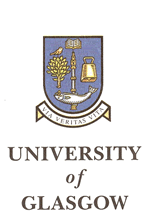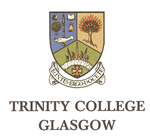| |
|
|
Trinity College Glasgow/School of Divinity, University of Glasgow
(Print |
Send a update)
Nr 4, The Square, University of Glasgow
Glasgow G12 8QQ
Scotland
United Kingdom of Great Britain and Northern Ireland (Europe)
Telephone: +44 141 330 6526/4607
Fax: +44 141 330 4943
Address-No.: 11501 / 6314
Information in the internet:
URL: http://www.religions.divinity.gla.ac.uk
Languages of the website: English
 The university was founded in 1451, Trinity College in 1856. It was reunited in 1930 (Faculty of Theology). The university was founded in 1451, Trinity College in 1856. It was reunited in 1930 (Faculty of Theology).
Trinity College has exchange agreements in theology with
Columbia Theological Seminary, Decatur, Georgia, USA
Princeton Theological Seminary, New Jersey, USA (Glasgow to Princeton only)
York University, Toronto, Canada
University of Neuchatel, Switzerland
Through Erasmus/Socrates Programme:
Trinity College, Dublin
Tübingen University
Free University, Berlin
Humboldt University, Berlin
Mainz University
Prague University
Reformed University, Budapest
Aarhus University
Berne University
Vienna University
Oslo University
Trinity College and the School of Divinity also sometimes train students for the ministry of the Presbyterian Church in Ireland, the Non-Subscribing Presbyterian Church of Ireland, and the Episcopal Church of Scotland.
|
 Text that Trinity College asked us to publish: Text that Trinity College asked us to publish:
In Glasgow, as elsewhere in Scotland and throughout Europe, the study of theology followed the old tradition of being offered in a multi-faculty university rather than in a separate seminary or Church college.
From 1451 to 1567, theology at Glasgow University was linked to the requirements of the Roman Catholic Church, whose Pope had issued the founding charter in 1451. It’s most noted teacher and University Principal was the Scholastic theologian, John Major or Mair. After the Reformation in 1560, the provision of theological education was linked to the Church of Scotland (predominantly Reformed and Presbyterian). Some notable teachers were Andrew Melville, John Cameron, Robert Baillie, Gilbert Burnet, Francis Hutcheson (the philosopher-theologian), and John Caird.
In the nineteenth century, a schism within the Church of Scotland occurred resulting in the creation of the Free Church of Scotland. The Free Church also established its own colleges or seminaries detached from the universities for the education of its ministers, as well as for the theological education of female medical missionaries. The Glasgow College, funded by local subscription, was established in 1856. This multi-disciplinary institution of considerable reputation existed outside of continuing university Faculty of Theology. Later, in 1930 following the reunion of the churches and theological teaching facilities, the Glasgow Church college was renamed ‘Trinity College’. Some notable teachers in the pre-1930 College included Archibald B. Bruce, James Denney, Thomas M. Lindsay. George A. Smith, James Moffatt, Henry Drummond, James Orr, and in the modern era within the reunited faculty, John Macquarrie, Ronald Gregor Smith, William McKane, William H.C. Frend, Ernest P. Best, William Barclay, John Zizioulas and Robert Carroll.
After the reunion of the main Scottish Presbyterian churches in 1929/30, the two teaching facilities in the University and the Church College were reintegrated. From 1976, when the Church-owned Trinity College buildings at Park Circus, were finally vacated, all teaching of theology took place in the university Divinity Faculty.
The identity of what since 2002 has been called the ‘School of Divinity’ in the Faculty of Arts remains in practice dual. Firstly, as a university School and Department teaching theology and religious studies, it is completely non-confessional and so open to everyone. Secondly, the association with the Church of Scotland is retained with the recognition of the continuing autonomous existence of ‘Trinity College’. Cooperation with the College and the Church is part of the School’s stated aims, and is constituted ultimately by parliamentary statute as a form of ‘concordat’.
What this means I that those students in the School and University who are candidates for the Church ministry are under the special supervision of Trinity College through its Principal and academic senate. The General Assembly of the Church of Scotland appoints the Principal. The College is the official channel of liaison between the School of Divinity, the Church of Scotland, and the continuing United Free Church of Scotland.
Until quite recent times, the University Faculty and Trinity College were effectively co-extensive. Most students were candidates for the ministry of the Church of Scotland or other Presbyterian churches, and to which also most staff also belonged. That has now changed. In the School of Divinity, currently about 15% percent of students are ministry candidates, mainly Church of Scotland.
Through the connection with Trinity College, various useful resources are made available for the teaching of theology and student welfare in the university Divinity School. For example, after 1976, the valuable library of the College was incorporated into the University Library including a large selection of works not in possession of the University quest lectureships, a departmental reference library (‘Divinity Workshop’), supplementary provision for additional book and periodical acquisitions in the University Library, some travel bursaries for study at Princeton and at the Bossey Ecumenical Institute in Switzerland, prizes and hardship assistance, a Church Secretary, as well as hospitality support for social events involving everyone connected with the Divinity School.
The financial assets of Trinity College belong to the Church of Scotland, and are disbursed through a Glasgow law firm, Wright, Johnston & Mackenzie, and the College Senate.
Current Trinity College Office-bearers:
Principal: Rev Professor George Newlands (G.Newlands@arts.gla.ac.uk)
Clerk: Professor Ian Hazlett (I.Hazlett@arts.gla.ac.uk)
Treasurer: Mr Ian Macdonald
Church Secretary: Ms Hazel Wright
Background reading:
Stewart Mechie, Trinity College Glasgow 1856-1956, London & Glasgow 1956.
W. Ian P Hazlett (ed.), Traditions of Theology in Glasgow 1450-1990, Edinburgh 1993.
D. Wright, ‘Trinity College Glasgow’, in Dictionary of Scottish Church History & Theology, Edinburgh 1991.
|
Information of theological training facility
Type of school: |
University |
Founded in |
1451 |
Languages in use |
English |
Full/part-time staff |
15 |
Admission requirements |
3 Bs and a C Scottish highers, 2 Cs and a D A-levels (undergraduate studies) |
Degrees offered |
Bachelor of Divinity (academic + church vocation), Master of Arts (Religious Studies), Master of Theology, Doctor of Philosophy (by thesis), Master of Letters, Doctor of Letters |
|
training for ministers possible |
|
training for teachers possible |
|
practical training possible |
|
Library present
Library size: 100000 |
Confessions |
Apostles's Creed, Nicene Creed, Scots Confession (1560), Second Helvetic (1562), Westminster Confession (1646/47) (Church of Scotland students only, but only in regard to the "substance" of such creeds and confessions.) |
Members and partners:
last update: 04.05.2005
» back to the list
|